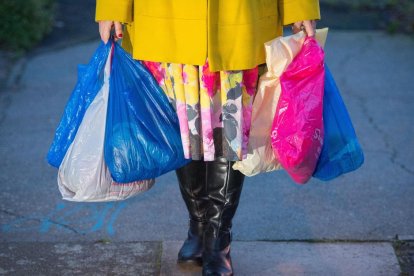Biodegradable bags have a high level of toxicity
The Spanish National Research Council explained that high levels of toxicity impact the accumulation of pollutants, which can affect the environment and negatively impact the health of the population.

(Cordon Press)
A preliminary study carried out by the Spanish National Research Council showed that compostable bags are more toxic than conventional plastic ones. The research was published by the Journal of Hazardous Materials and led by scientists from the Institute of Environmental Diagnostics and Water Studies (IDAEA-CSIC) and the Institute of Agrochemistry and Food Technology (IATA-CSIC) together with Susplast.
The Spanish National Research Council noted that "the results show a high level of toxicity in compostable plastic bags, which increases with photodegradation, that is, when ultraviolet rays affect them. Although the study is preliminary, with a small number of bags, these results are representative of their degradation processes."
"We were surprised that cells exposed to conventional plastic bags showed no traces of toxicity. However, we did detect it in the biodegradable ones, which decreased the viability of the cells," explained Cinta Porte, lead author of the study and researcher at the IDAEA-CSIC.
'Pollutants that can affect the environment'
The analysis also explained that recycled plastic bags also showed higher levels of toxicity than conventional ones. This is because plastic additives are added for reuse. "The study led by the IDAEA-CSIC demonstrates that the toxicity observed in compostable bags is transferred to the compost during the biodegradation process, which has an impact on the accumulation of contaminants, which can affect the environment and negatively impact the health of the population," the research council explained.
The council reiterated that this is a preliminary study. For this reason, it has requested that further research be conducted regarding the results. The researchers, however, highlighted the need to take measures to regulate the plastic additives that are added to these bags.
'We invite you to say "no more" to this material'
This preliminary study would dismantle the progressive narrative that biodegradable bags supposedly cause less damage to the environment. For years, the idea to stop using normal bags and replace them with biodegradable bags in grocery stores has been promoted and directed by international organizations. For example, in 2018, the United Nations (UN) published an article titled "Either we divorce ourselves from plastic, or we can forget about the planet."
The UN assured that: "if measures are not taken, by 2050 there will be nearly 12 billion tons of plastic waste distributed in landfills and in the ocean. On World Environment Day, we invite you to say 'no more' to this material."
In addition, the organization assured that "studies suggest that plastic bags and containers made of Styrofoam can take up to thousands of years to decompose and contaminate soil and water. ... In addition, over time plastics break down into smaller fragments called microplastics that, when consumed by marine animals, can enter the human food chain."
In this sense, the UN encouraged governments to ban plastic bags:
RECOMMENDATION





















